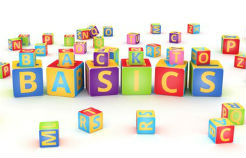The From Line
Back to Basics: Email Composition “No-Brainers”
 Business email in the corporate setting is generally formal, where million dollar words are common and industry jargon is a must. Marketing messages however, are most effective when they are kept simple. To avoid alienating your audience with useless “fluff”, follow these tips.
Business email in the corporate setting is generally formal, where million dollar words are common and industry jargon is a must. Marketing messages however, are most effective when they are kept simple. To avoid alienating your audience with useless “fluff”, follow these tips.
1. Get Rid of the Big Words
You’re composing a marketing message, not playing a game of scrabble. Longer, more obscure words will not win you extra points. Avoid using words that are more than two syllables. This rule of thumb helps ground the writer to basic speaking rules and establishes a smooth cadence. The goal is to compose a message that is effortless for the recipient to read and understand. Certainly the recipient is capable of understanding bigger words, but simplifying the message makes it both universally accessible and faster to digest.
2. Omit Technical Terms and Jargon
Read the email after it is written. Are there industry specific terms? Drill them down to more generalized terms. Consider the recipient and their knowledge base. A great amount of time will be saved if industry terms and jargon are avoided. The recipient will understand the message and valuable marketing dollars will not have been wasted on a missed meaning.
3. Get a Second Set of Eyes
Is there someone in the office who does not know as much about the industry jargon as the author? Perhaps there is an intern or someone from a different department who can read the email. The idea is for the author to step away from the document before it is sent and to have an unbiased reader give it a once over. The author is invested in the words and will likely skip over terms that are possibly confusing. A separate set of eyes can point out terms that need clarification and can give input and suggestions to make the message as inviting and easy to understand as possible. An unfarmiliar reader will bring a fresh interpretation that can predict how the message will be received by subscribers.
The idea isn't to "dumb down" the email, but rather to compose a message that is readable by a person who does not understand all the jargon of the industry. The email needs to be written for an intelligent audience who is interested in being educated about the industry. Keep it simple but don't talk down to your recipient.
When you subscribe to the blog, we will send you an e-mail when there are new updates on the site so you wouldn't miss them.
